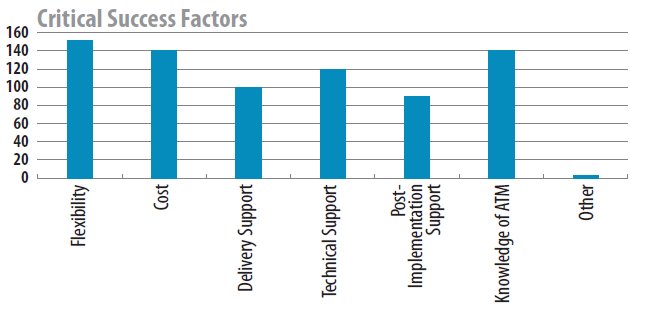.png)
The FASTI programme has always highlighted the key role which industry plays in deploying new technology, and has encouraged a partnership approach between EUROCONTROL, ANSPs and industry, notably through its Pioneer Projects North and South. This type of collaboration has shown that a win-win outcome can be achieved by working closer together.
Europe comprises a patchwork of suppliers deploying FASTI tools across the network.
Europe comprises a patchwork of suppliers deploying FASTI tools across the network.
 Key questions for industry
Key questions for industryAgainst this background, industry is keen to have a standard
product line which can be resold from one customer to another.
This can perhaps lead to a lack of incentive to improve the
performance of products in the short term. The following are
questions which need to be addressed by system suppliers in Europe:
What is their view on developing tools which are fit for
purpose?
What are the lessons learned from the past?
How can we improve system performance to achieve
improved operational performance?
How can we do things differently in the future?
.png)
The FASTI programme has always highlighted the key role
which industry plays in deploying new technology, and has
encouraged a partnership approach between EUROCONTROL,
ANSPs and industry, notably through its Pioneer Projects North
and South. This type of collaboration has shown that a win-win
outcome can be achieved by working closer together.
EUROCONTROL is seeking improvements to the European ATM
network, while ANSPs aim to improve their quality of service
and industry provides the tools to do the job. Promoting tools
which are fit for purpose has been the FASTI programmes
mantra for a number of years, requiring both industry and
ANSPs to focus more on the real need. A commonly agreed
concept such as FASTIs helps to reduce the risk of industrys
having to tailor each new delivery to various concepts
conceived at local level.
The critical success factors for ANSPs in their relationship with
their suppliers are:
1. the need to have a sound knowledge of ATM;
2. flexibility during the implementation process:
3. the need for costs to remain realistic and for technical
support to be available when required.
Pressure for cost reductions from the airspace users and the
Single European Sky II focus on improved network and ANSP
performance will mean that every investment in new systems
will need to demonstrate an improved level of service. No
longer will we be able to sustain situations in which tools and
systems are delivered and half the functionality is not used
owing to a lack of changes in controller working methods,
procedures or training.
The need for industry to provide or adapt systems to ensure
interoperability with neighbours, particularly in the context of
Functional Airspace Blocks, is also high on the agenda. Sometimes
we forget that the suppliers are selling to a global market
rather than being focused on the needs of old Europe. This
can lead to the impression that suppliers are slow to change or
to improve products, preferring stability in their product lines
to making ad hoc adaptations.
The common approach adopted by some ANSPs to defining
requirements and conducting procurement while at the
same time teaming up with a dedicated supplier can perhaps
provide a model for the future, even if some local tailoring of
systems is required. So the overall message to suppliers is do
not underestimate the role you play in future changes; we
need you, and we need you on our side!
You can read the complete FASTI Newsletter by following this link:
http://www.eurocontrol.int/fasti/gallery/content/public/Documents/FASTI_FOCUS_Oct2010_final.pdf
Single European Sky II focus on improved network and ANSP
performance will mean that every investment in new systems
will need to demonstrate an improved level of service. No
longer will we be able to sustain situations in which tools and
systems are delivered and half the functionality is not used
owing to a lack of changes in controller working methods,
procedures or training.
The need for industry to provide or adapt systems to ensure
interoperability with neighbours, particularly in the context of
Functional Airspace Blocks, is also high on the agenda. Sometimes
we forget that the suppliers are selling to a global market
rather than being focused on the needs of old Europe. This
can lead to the impression that suppliers are slow to change or
to improve products, preferring stability in their product lines
to making ad hoc adaptations.
The common approach adopted by some ANSPs to defining
requirements and conducting procurement while at the
same time teaming up with a dedicated supplier can perhaps
provide a model for the future, even if some local tailoring of
systems is required. So the overall message to suppliers is do
not underestimate the role you play in future changes; we
need you, and we need you on our side!
You can read the complete FASTI Newsletter by following this link:
http://www.eurocontrol.int/fasti/gallery/content/public/Documents/FASTI_FOCUS_Oct2010_final.pdf


.jpg)



.png)



